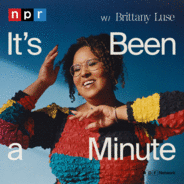
Kultur & Gesellschaft
It's Been a Minute Folgen
Want in on a secret? Your likes and dislikes didn't develop by accident. There are subtle and not-so-subtle forces around you, shaping what you think, how you act, and even who you think you are. Brittany Luse is here to break the spell and help you feel wiser in a society that makes things blurry.THE BEST POP CULTURE PODCAST AWARD WINNER AT THE 2025 SIGNAL AWARDSIt’s Been A Minute with Brittany Luse is the best podcast for understanding what’s going on in culture right now, and helps you consume it smarter. From how politics influences pop culture to how identity influences tech or health, Brittany makes the picture clearer for you every Monday, Wednesday, and Friday.It’s Been A Minute reaches millions of people every week. Join the community and conversation today.If you can't get enough, try It's Been a Minute Plus. Your subscription supports the show and unlocks a sponsor-free feed. Learn more at plus.npr.org/itsbeenaminute
Folgen von It's Been a Minute
-
Folge vom 26.11.2025Dreading family conflict? Here's some advice.Fighting with your family doesn’t have to be a holiday tradition.The majority of Americans will celebrate Thanksgiving tomorrow. And while it’s meant to be a time of family togetherness… sometimes, this holiday can make you never want to see your family again. To go or not to go? To fight or not to fight? Well, our friends at NPR’s Life Kit have tips for how to answer these questions. Marielle Segarra, host of Life Kit, speaks with experts and identifies 12 strategies to keep your family dinner peaceful this year.Follow Brittany Luse on Instagram: @bmluseFor handpicked podcast recommendations every week, subscribe to NPR’s Pod Club newsletter at npr.org/podclub.Learn more about sponsor message choices: podcastchoices.com/adchoicesNPR Privacy Policy
-
Folge vom 24.11.2025Kids are expensive. Do they have to be?Can you afford to pay two rents?Families across the country are asking that same question when it comes to childcare, as the yearly costs for daycare are becoming comparable to a year's rent in many places. How did childcare become so expensive, and how might everyone benefit if the government provided more support to parents? Professor of Sociology at the University of Wisconsin-Madison Jessica Calarco, and Senior Fellow at the Think Tank Capita Elliot Haspel are here to help Brittany find out. Follow Brittany Luse on Instagram: @bmluseFor handpicked podcast recommendations every week, subscribe to NPR’s Pod Club newsletter at npr.org/podclub.Learn more about sponsor message choices: podcastchoices.com/adchoicesNPR Privacy Policy
-
Folge vom 21.11.2025Do you want out of The Cult of Homeownership?When the dream of buying a home seems unattainable, is it time to find a new dream? Or is there another option on the table?Bill Pulte, the director of the Federal Housing Finance Agency, or the FHFA, said the administration is “working on” a plan to introduce 50 year mortgage terms for homebuyers. But some Americans have already been working on their own plans towards homeownership… and it’s not the ‘nuclear family’ route. Brittany is joined by NPR chief economics correspondent Scott Horsley and NPR producer & author of The Other Significant Others: Reimaging Life with Friendship at the Center, Rhaina Cohen to get into the cult of homeownership in America. Together they search for a new outlook of what ‘adulthood’ looks like.(0:00) Will Millennials and Gen-Zers be able to buy homes?(7:56) Why Trump's mortgage policy probably won't work(10:53) The fundamental reasons housing is so expensive(12:37) Want to buy a home? Consider these options.(20:13) Responding to your commentsFollow Brittany Luse on Instagram: @bmluseFor handpicked podcast recommendations every week, subscribe to NPR’s Pod Club newsletter at npr.org/podclub.Learn more about sponsor message choices: podcastchoices.com/adchoicesNPR Privacy Policy
-
Folge vom 19.11.2025Crime is down. Why don't people feel safe?What’s the difference between feeling unsafe and being unsafe?According to Gallup, about half of Americans see crime as being extremely or very serious. And there are a lot of very real threats out there to people’s safety, but there’s also a lot of fearful rhetoric that’s more unfounded. While immigrants are less likely to commit crimes than U.S.-born citizens, and trans people are unlikely to commit mass shootings, fear of these groups is being weaponized against them. So how can we disentangle being unsafe and feeling unsafe – and better protect ourselves and each other? Brittany gets into it with Nicole Lewis, engagement editor at The Marshall Project, and Lex McMenamin, writer and editor.Follow Brittany Luse on Instagram: @bmluseFor handpicked podcast recommendations every week, subscribe to NPR’s Pod Club newsletter at npr.org/podclub.Learn more about sponsor message choices: podcastchoices.com/adchoicesNPR Privacy Policy
